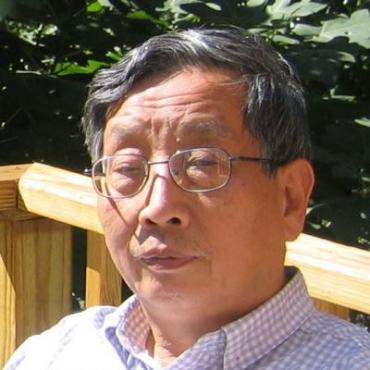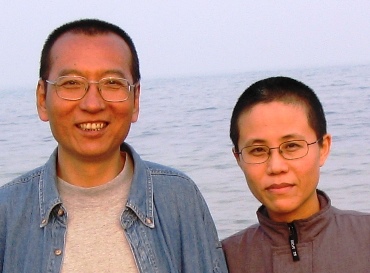[English Translation by Human Rights in China]
The Chinese original was first published in Human Rights in China’s Chinese language journal, HRIC Biweekly:
http://www.hrichina.org/chs/zhong-guo-ren-quan-shuang-zhou-kan/hu-ping-sang-zhong-wei-shui-er-ming
This is a sorrowful moment: On July 13, 2017, at 5:35 p.m., Liu Xiaobo died in Shenyang, China, from liver cancer which had not received timely treatment. The world stared blankly and helplessly as a Nobel Peace Prize laureate died at the hands of the tyranny of the Communist Party of China, unable to do anything. It was only after Liu Xiaobo passed away that Western leaders mentioned Liu Xiaobo’s name and paid tribute to him in their public remarks. But they did not sternly condemn the Chinese government that imprisoned a Nobel Peace Prize winner until his death. In China, due to many years of suppression by the authorities, only a small group of people are mourning Liu Xiaobo; most people are either indifferent or silent. Therefore it seems that, to many people, the cause Liu Xiaobo threw himself into is but a small bubble outside of China’s mainstream society.
No, no, this is not the case at all. We should not forget, 28 years ago, China erupted in an unprecedented peaceful democratic movement. On the day that Liu Xiaobo flew from New York back to Beijing, where the April 27 marches broke out, Chang’an Avenue became an ocean of people and banners, of which one could not see the end. The 1989 Democracy Movement forcefully proved that, in China, liberal democracy was not only the pursuit of an extremely small number of dissidents, but was the common aspiration of tens of thousands of people—first and foremost, it was the common aspiration of an entire generation of young people. The hardliners of the Communist Party of China, led by Deng Xiaoping, used unimaginably brutal methods to suppress the people, resulting in an unprecedented divide among the CPC leadership and triggering unanimous condemnation by the international community. In the same year, the Soviet Union and Eastern Europe underwent monumental changes that ended with the disintegration of the international communist order, with the United States becoming the world’s sole superpower, and liberal democratic forces achieving the most glorious victory in history. At the time, there was a widespread belief that the collapse of the CPC’s repressive regime was just around the corner.
Yet, 28 years have passed, and the CPC dictatorship has not collapsed; it is standing strong and has become more powerful than before, especially with the economy’s continued high-speed development, which has surpassed the average person’s predictions. What also exceeded many people’s predictions is that the CPC did not initiate political reform as it intensified economic reform. It has not even become gentler and more tolerant as it gained enormous economic success, but instead has become more brazen and more despotic. In international affairs, China no longer keeps a low profile, but instead has become more bombastic and aggressive. At the same time, democratic countries, including the United States, have encountered a multitude of problems. In just the short span of less than thirty years, we have witnessed an astonishing reversal of the entire world that is extremely rare in human history: the rise of an authoritarian China constituting the most serious challenge to universal values to date.
In 2005, Liu Xiaobo wrote in the essay “Lost in the Arms of Tyranny: The Western Left”: “My concern is, in the face of the world’s largest authoritarian country—China—Westerners may now repeat a huge mistake.” Liu Xiaobo admonished the international community:
International mainstream society must pay close attention to this reality: in its contest with the free world, the authoritarian Communist Party of China is already completely different from the traditional totalitarian Soviet Communist Party. The CPC no longer clings to ideology and military resistance; it has shifted towards dedicating itself to developing the economy and abandoning its numerous ideological friends. It both carries out market-oriented economic reform and strives to integrate into globalization, but also clings to a dictatorial political system, using all its might to prevent China’s ‘peaceful evolution’ [perceived by the Chinese authorities to be] driven by the West. It is not hard to see that, with its bulging wallet, the CPC regime’s checkbook diplomacy across the world has already enabled it to become the blood transfusion machine for other authoritarian countries—using economic and trade interests to divide Western alliances, and using large markets to entice and threaten Western capital. In the face of the rapidly growing economic strength of this powerful dictatorship, if the rise of its dictatorial power does not receive forceful external constraints, if others continue to appease China’s rising dictatorship, then the world will retread the disastrous path of history, and the result will not only be a catastrophe for the Chinese people, but also disastrous for the process of global liberal democratization. Therefore, to constrain the negative impact of a rising autocracy on world civilization, the free world must help the world’s largest dictatorial country transform into a liberal democracy as soon as possible.
From being a key player in Tiananmen Square to passing away alone in Shenyang’s First Hospital of China Medical University, Liu Xiaobo’s fate not only reflects the plight of China’s democracy, it is also a wakeup call to the world. Twenty-eight years ago, who would have imagined that today’s world would become like this? At this rate, the world in another 28 years will be unthinkable. For whom does the bell toll? I hope Liu Xiaobo’s death will become the start of a reversal.

